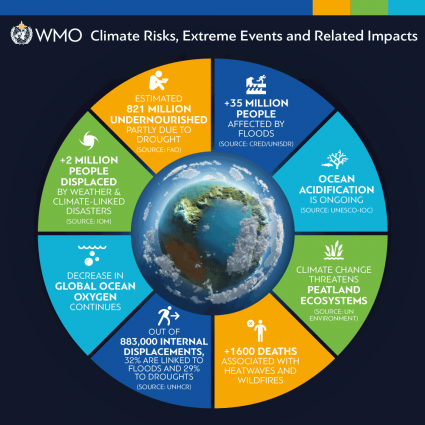WMO Statement on the State of the Global Climate in 2018
The World Metereological Organization (WMO) marks the twenty-fifth anniversary of the WMO Statement on the State of the Global Climate, which was first issued in 1194. The 2019 edition treating data for 2018 marks sustained international efforts dedicated to reporting on, analysing and understanding the year-to-year variations and long-term trends of a changing climate.
Some of the data released in this report is:
– Climate action: The past four years were the warmest on record, with the global average surface temperature in 2018 approximately 1°C above the pre-industrial baseline.
– Hazards: In 2018, most of the natural hazards which affected nearly 62 million people were associated with extreme weather and climate events.
– Food security: In 2017, the number of undernourished people was estimated to have increased to 821 million, partly due to severe droughts associated with the strong El Nino of 2015-2016.
– Displacement: Out of the 17.7 million Internally Displaced Persons (IDPs) tracked by the International Organization for Migration, over 2 million people were displaced due to disasters linked to weather and climate events as of September 2018.
– Heat, Air Quality and Health: There Between 2000 and 2016, the number of people exposed to heatwaves was estimated to have increased by around 125 million persons, as the average lenght of individual heatwaves was 0.37 days longer, compared to the period between 1986 and 2008, according to the World Health Organization.
– Environmental Impacts include coral bleaching and reduced levels of oxygen in the oceans.
For more information, download the report, access to the WMO official page or contact: Clare Nullis, media officer cnullis@wmo.int

State of the Climate in 2018 shows accelerating climate change impacts
https://public.wmo.int/en/media/press-release/state-of-climate-2018-shows-accelerating-climate-change-impacts
